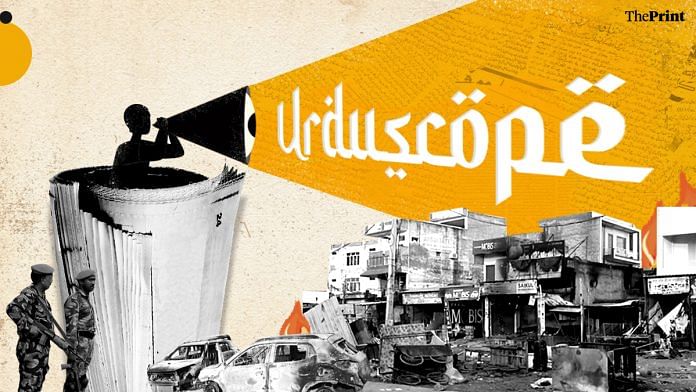New Delhi: Communal incidents dominated the front pages and editorials of the Urdu press this week, with newspapers denouncing the violence in Haryana, as well as the shooting of a Railway Police Force officer and three Muslim passengers onboard a running train in Maharashtra.
Some editorials placed the responsibility for communal incidents squarely on the mainstream media and the political establishment. While Siasat described a section of the news media as “hypocritical, reckless, and provocative”, Roznama Rashtriya Sahara alleged that some politicians “have been poisoning the country for 10 years”.
The protests that Hindutva outfit Vishva Hindu Parishad (VHP) and its youth wing Bajrang Dal held against the Nuh violence also received wide coverage in three major Urdu newspapers — Inquilab, Siasat, and Sahara.
Other topics covered include the ongoing Monsoon Session of Parliament and Opposition protests against the ethnic violence in Manipur and the new anti-Bharatiya Janata Party (BJP) opposition formation INDIA, short for Indian National Developmental Inclusive Alliance.
ThePrint brings a roundup of the front-page headlines and editorials in the Urdu press this week.
Also Read: ‘First Kashmir Files, now The Kerala Story’: Films being used to fuel hate, writes Urdu press
Haryana violence & Maharashtra train shooting
A religious procession organised by the VHP and its affiliate Matru Shakti Durga Vahini in Nuh turned violent Monday, leading to stone pelting and arson. The violence eventually spread to Gurugram, where a mosque was burned down.
In all, six people, including two home guards and an imam of the burnt Gurugram mosque, were killed in the flare-up. In Maharashtra, meanwhile, a Railway Police Force constable, Chetan Singh, allegedly shot a senior colleague and three Muslim passengers on board the Jaipur-Mumbai Central Superfast Express in the early hours of Monday.
Both these incidents were covered prominently in Urdu publications.
Inquilab, Sahara, and Siasat, all reported the Haryana violence on their front pages, with the latter implying that it was part of a larger pattern of communal incidents observed just before elections.
While several states — Madhya Pradesh, Chhattisgarh, Mizoram, Rajasthan, and Telangana will hold assembly elections later this year, the Lok Sabha and Haryana assembly elections are due to be held in 2024.
In an editorial on 2 August, Siasat wrote that in Maharashtra, RPF constable Chetan Singh coincidentally opened fire on a moving train around the same time. The incident, the editorial said, has been portrayed as “normal”, and the suspect is said to be suffering from mental distress. Instead of punishing him, efforts are being made to save the suspect and influence investigation, it noted.
About the Nuh violence, the editorial wrote that instead of bringing the perpetrators to book, a smear campaign is now being run against Muslims. The article blamed India’s mainstream news media for this and said that efforts are being made to influence investigations even before they begin, attributing this trend to political signals.
In its editorial the same day, Sahara blamed saw the firing as an outcome of hate speeches from politicians, adding that parliamentary and constitutional rulers also feature among those who are vitiating the atmosphere.
The editorial suggested that some identify people by their clothes, others openly threaten to make Muslims “feel the cold of Shimla even in the heat of May and June” — a reference to a speech made by Uttar Pradesh Chief Minister Yogi Adityanath in Hapur in the run-up to the 2022 assembly election.
In order to save the country, the editorial goes on to say, it’s vital to speak out against the growing atmosphere of hate and put an end to the venom.
In its editorial on 3 August, Inquilab said that the shooting incident in Maharashtra, the violence in Haryana, and even other communal incidents should not be seen in isolation. It said that all such incidents are a result of an atmosphere of hate, where people are pitted against each other and where every effort is made to shield the guilty, reward them, or, where they are convicted for a hate crime, reduce their sentence.
Parliament and Manipur violence
The ongoing standoff in Parliament between the BJP-led National Democratic Alliance (NDA) government and the Opposition over the ethnic clashes in Manipur invited comment from the Urdu press.
Ethnic clashes erupted between Manipur’s tribal Kuki and non-tribal Meitei communities on 3 May following a ‘Tribal Solidarity March’ taken out to oppose the inclusion of Meiteis in the Scheduled Tribe (ST) category. Manipur has been on the boil since, with the death toll currently standing at over 150.
In its editorial on 1 August, Sahara wondered why the violence still continued unabated nearly three months. It’s surprising, the editorial said, that the violence has been allowed to continue for this long and wondered why the Manipur government couldn’t stop it. It, however, warned against politicising the issue, saying what was needed was compassion and empathy.
Although the papers covered the Opposition protest over Manipur widely, other issues in Parliament, such as the controversy over the Government of National Capital Territory of Delhi (Amendment) Bill, 2023, were also reported. The Bill, passed in Lok Sabha Thursday amid an Opposition walkout, seeks to replace the controversial ordinance on Delhi’s services and has been criticised for subverting India’s federalism.
In its editorial on 1 August, Siasat’s editorial commented on the Opposition’s I.N.D.I.A alliance, claiming that it added to the BJP’s and the NDA’s troubles.
Referring to the NDA meeting in July, it said Prime Minister Narendra Modi’s image of being all-powerful has been proved to be hollow and empty, adding that it was for this reason that the BJP was forced to call upon even those parties that had left the alliance.
(Edited by Uttara Ramaswamy)
Also Read: People accustomed to seeing every problem through lens of religion, says Urdu press on hate speech



